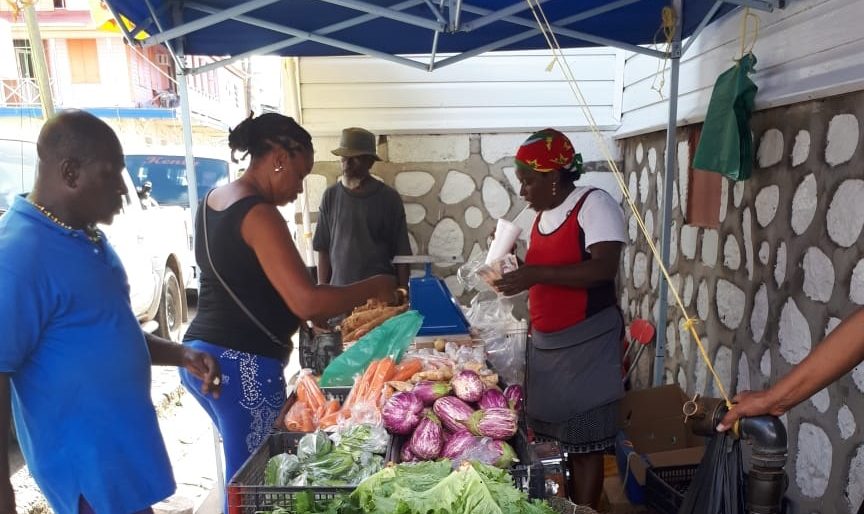The Caribbean is ‘cash ready’ – but are humanitarian actors?

The Caribbean Atlantic hurricane season starts today, amidst the unprecedented COVID-19 response. At the launch of the CALP Network’s “Winds of Change” briefing note on the use of CVA in the Caribbean, Ms. Andria Grosvenor, Acting Deputy Executive Director of the Caribbean Disaster Emergency Management Agency (CDEMA) stated, “The relevance of cash and voucher assistance in the Caribbean increases one thousand fold.” The region’s generally strong financial infrastructure, markets, local capacities and social protection systems provide significant opportunities for scaling up humanitarian CVA. Despite these opportunities, the CALP Network’s research found international humanitarian actors were challenged by their limited institutional presence and the Caribbean’s often under-estimated complexities.
In the Caribbean, there are significant opportunities to increase the use of CVA as a go-to response, recovery and resilience tool, while also mitigating the challenges of unsolicited in-kind donations from the well-intentioned public. CVA has been documented in the Caribbean since at least 2004, with Hurricane Ivan in Jamaica and most recently in the 2019 Hurricane Dorian response in The Bahamas. CVA gained prominence as a critical recovery tool in government-led and humanitarian-supported social protection programmes in the British Virgin Islands and Dominica in the devastating aftermath of Hurricanes Irma and Maria (2017).
In 2018, a CDEMA review of these responses called for stakeholders to “re-examine cash, voucher and livelihood revitalization initiatives for sustainability, impact on cultures and economies.” Responding to that call, the CALP Network’s new briefing note collates lessons from previous responses in preparation for the 2020 season which is forecast to be above normal.
Five lessons to act on:
Lesson 1: Go local – and be humble.
In the Caribbean there are strong national and local capacities including government personnel, Red Cross national societies, Rotary clubs, church groups and other civil society actors – invest in them!
Compared to international humanitarian actors, with limited or non-existent footprints in the region, local actors possess a deep and nuanced understanding of the context, culture, communities and local dynamics. A frequent miscalculation of international humanitarian actors in the Caribbean is to assume that what worked on one island would work in another, without accounting for differing political dynamics, history, governance structures, language and culture.
Lesson 2: Develop the software while building the hardware
Relationships are very important in the region, in part due to the geography, small populations (with several states hosting populations in the tens of thousands) and tight knit communities where ‘everyone knows everyone’. Scaling up requires political buy-in and can encounter cultural obstacles, however, humanitarian actors also need to be able to quickly shift their role from sensitising partners on CVA to supporting institutionalisation in the preparedness phase. This is not just about investing in skills development with CVA training but pre-positioning agreements with financial service providers and developing SOPs and systems for CVA delivery. With the increasing intensity of natural disasters due to climate change, building resilient communities and institutions, nationally, will be key to supporting affected populations to not just “bounce back, but bounce forward,” as aptly noted by Ms. Grosvenor.
Lesson 3: Humanitarian market assessments aren’t the holy grail for CVA feasibility
Market assessments based on extensive primary data collection exercises are one of the initial steps usually conducted by humanitarian actors to determine CVA feasibility in a response. However, in most Caribbean states, relatively comprehensive data usually exists on populations, socio-economic conditions, markets, commodity prices and infrastructure, rendering the comprehensive, in-depth humanitarian market assessments moot – or at least, not the most efficient use of limited resources. Despite – and due to – the island geography, there is a deep inter-dependence on the flow of goods between islands, which is one of the top response priorities of governments in the region when disasters disrupt supply chains.
Lesson 4: There are no ‘one size fits all’ financial service provider
Going local can be challenging when it comes to selecting financial service providers (FSPs), which must be assessed island by island, due to differing national financial regulations. For international humanitarian actors, this means that the primary options are to:
- use an expensive, but relatively fast global or regional FSP
- use a national FSP (often a bank), which often takes time to set-up but is cost-efficient
- work through existing government transfer systems, taking time to build effective partnerships; or
- use cash-in-hand, though this is seldom preferred due to the availability of digital cash options and traceability needs.
The number of delivery options give all stakeholders – government, local and international responders and donors – the opportunity to acknowledge the trade-offs of the different mechanisms and ensure complementarity between rapid response and recovery and resilience-oriented interventions.
Lesson 5: Leave no one behind
Exclusion of migrant, refugee, undocumented and other marginalised groups is a significant humanitarian challenge in the Caribbean. Haitian migrants and stateless persons, as well as the increasing population of Venezuelans in the Caribbean, are some of the groups which humanitarian organisations have struggled to reach in recent hurricane responses – yet are often the most impacted. As the center of gravity shifts to building shock-responsive government capacities and response systems, there is a clear role for humanitarian actors to advocate to governments to include vulnerable populations in disaster response, as well as to respond to their specific needs.
The complexities of the Caribbean are rightfully forcing a new humanitarian approach, one which matches the humanitarian ideals of strengthening ‘the nexus’ and building local capacities and systems, while also focusing on inclusion. Many of these lessons are not CVA-specific and emphasise the need for strong preparedness efforts, based on working with and through local, national and regional actors and processes. The Caribbean is ripe for scaling up CVA and given the relatively limited contextualised evidence base, it is critical that stakeholders share learning and collaborate to ensure that affected populations can access the financial resources to recover and build resilience with dignity.
Main image: Jennie Trow/OCHA


